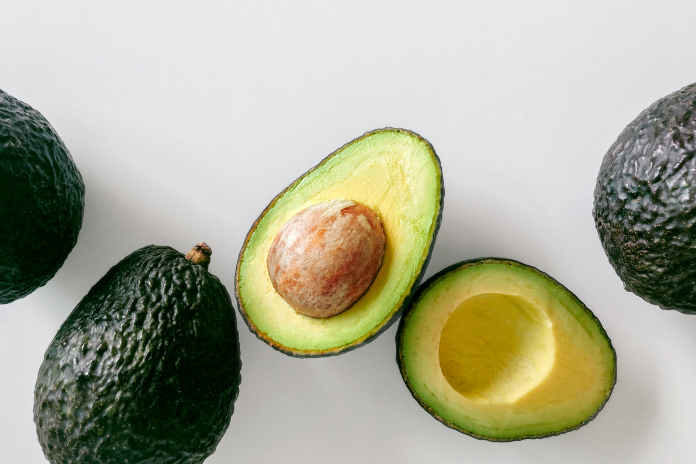Avocados are a creamy-textured stone fruit that grows in warm regions. Their possible health advantages include improved digestion, reduced depression risk, and cancer prevention.
Avocado is also called a gator pear or buttery fruit. It is one of the only fruit that has a significant quantity of beneficial polyunsaturated fatty acids. Avocados are a nutrient-dense fruit that includes over 20 minerals and vitamins in their natural state.
Nutritional Composition of Avocado
- Vitamin K: 26% of the daily value (DV)
- Folate: 20% of the DV
- Vitamin C: 17% of the DV
- Vitamin B5: 14% of the DV
- Potassium: 14% of the DV
- Vitamin B6: 13% of the DV
- Vitamin E: 10% of the DV

12 Health Benefits of Avocado
Rich in Nutrition
Avocados are high in thiamine, serotonin, folic, niacin, potassium, and magnesium, and also vitamins C, E, K, and B-6. Avocados are high in healthy, beneficial fats that help you feel satisfied and full. When you eat fat, your brain sends a signal that tells you to stop eating. Eating fat inhibits carbohydrate digestion, which helps to maintain blood sugar levels steady. Fat is required by each and every cell in the body.
Good for Your Heart
Avocados contain 25 milligrams per ounce of beta-sitosterol, a plant-based sterol. Beta-sitosterol as well as other plant sterols have been shown to sustain cholesterol levels when consumed on a regular basis.
Great for Eyes
Avocados include lutein and zeaxanthin, two phytonutrients that are particularly abundant in the tissues of the eyes. They give antioxidant protection against damage, as well as that caused by UV radiation.
Avocados’ mono fatty acids aid in the uptake of other healthy fat-soluble antioxidants like beta-carotene. According to a reliable source, including avocados in your diet can lower your chance of getting age-related macular degeneration.
Osteoporosis Prevention
Bone health necessitates the use of vitamin K. Half an avocado has around 25% of the daily required vitamin K consumption. This vitamin is frequently underappreciated, yet it is critical for bone health. When it comes to minerals necessary for supporting healthy bones, vitamin K is frequently overlooked by calcium and vitamin D. Nonetheless, consuming a diet rich in vitamin K can help bone health. It does so by boosting calcium absorption and lowering calcium excretion via the urine.
May Help in Cancer
Food-based folate has been found to help prevent malignancies of the colon, stomach, pancreas, and cervix. Researchers think that folate protects against undesired mutations in DNA and RNA throughout cell division. Despite the fact that the process behind this seeming risk reduction is unclear.
Avocados also might play a significant role in the treatment of cancer, according to some investigation. They found that phytochemicals collected from avocados can preferentially stop the development of precancerous and cancerous cells. Thus causing cancer cells to die, while motivating the proliferation of cells of the immune system known as lymphocytes.
Healthy Babies
Folic acid is another name for folate. Folate is critical for a successful pregnancy. Appropriate nutrition lowers the incidence of miscarriage and neuromuscular junction abnormalities during pregnancy. According to a recent study from McGill University, newborn mice were conceived using sperm from rats with a folate shortage. They had a 30 percent greater prevalence of a range of birth abnormalities than mice produced using sperm from rats with appropriate folate levels.
Helps in Depression
Folate aims to minimize the development of homocysteine. It is a chemical that can impede circulation and nutrition delivery to the brain. Foods high in folate may assist to reduce the risk of anxiety. Homocysteine overload can also disrupt the synthesis of dopamine, serotonin, and norepinephrine, which control mood, rest, and hunger.
Good for Digestion
Avocados are abundant in fiber, with about 6-7 grams per half fruit, despite their creamy texture. Consuming natural fiber-rich foods can help avoid constipation. It also promotes digestive health and reduces the risk of colon cancer.
Natural Detoxification
Frequent bowel movements are necessary for the daily elimination of toxins by the bile and stool, aided by enough fiber. Dietary fiber may also help to regulate the immune system and inflammation.
Osteoporosis Treatment
Saponins may be found in avocados, soy, and other green vegetables. They have been linked to a reduction in knee osteoarthritis signs. There are further studies being conducted to evaluate the long-term impacts of isolated extracts.
Antimicrobial
Avocados contain antibacterial compounds that are particularly effective against Escherichia coli, a common cause of foodborne illness.
Protection from Chronic Disease
High fiber intakes are related to considerably decreased risks of cardiovascular disease, stroke, pressure, diabetes, overweight, and some gastrointestinal disorder. Increased fiber consumption has also been found to reduce cholesterol and blood pressure, improve insulin sensitivity, and help obese people lose weight.
How to consume avocados?
Gently pushing into the skin of avocado will reveal how ripe it is. If the avocado is solid and won’t budge, you’ll need to wait a few days for it to ripen before eating it. Softer avocados are ideal for slicing and putting to salads or sandwiches. While soft avocados are ideal for guacamole or dip. Put the avocado in a bag with bananas to accelerate the ripening process.
Quick tips:
- Instead of butter, put avocado on toast for breakfast.
- Avocado can be used in place of mayonnaise in chicken or egg salads, or as a sandwich spread.
- Avocados are a great first food for newborns because of their smooth, creamy texture and mild flavor.
5 Recipes for Avocado
- Coriander & Avocado Relish
- Tossed Mixed Salad
- Avocado Chicken Kebabs
- Corn and Avocado Salad
- Guacamole
Conclusion
Avocados are a superfood when eaten in moderation. They’re a healthy powerhouse that’s also indisputably tasty, which is about as good as it gets.
References
https://foodrevolution.org/blog/avocado-health-benefits/